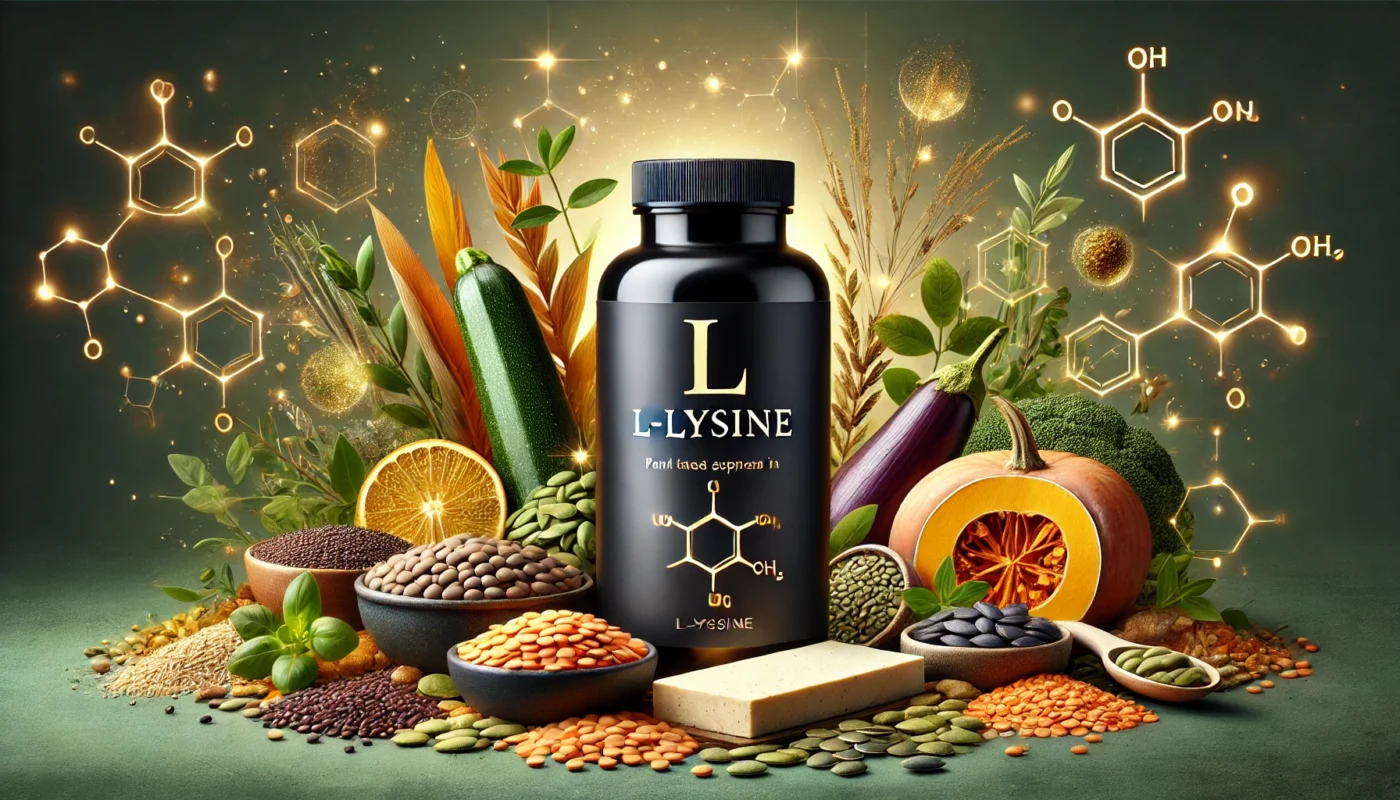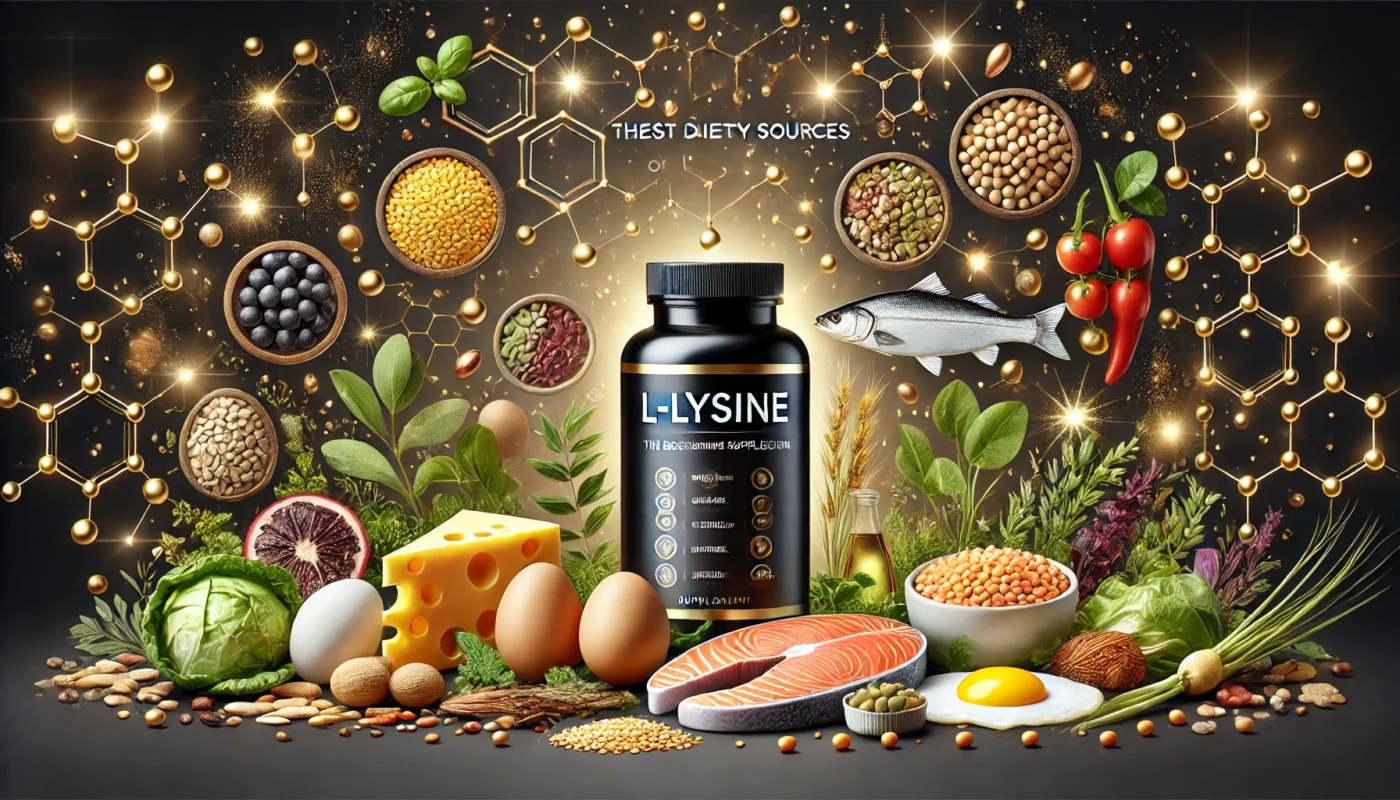L-lysine is an essential amino acid that plays a pivotal role in various bodily functions, from protein synthesis and immune support to skin health and collagen production. Unlike non-essential amino acids, the body cannot produce L-lysine, so it must be obtained through diet or supplementation. While many foods are rich in L-lysine, certain individuals may find it challenging to meet their needs through diet alone, making supplementation an attractive option. In this article, we will explore the best dietary sources of L-lysine, as well as why supplementation might still be necessary for optimal health.
You May Also Like:
L-lysine and Skin Repair: A Natural Solution for Scars and Wrinkles
L-lysine for Women’s Health: From PMS to Menopause Support
The Best Dietary Sources of L-lysine (And Why Supplements Might Be Necessary) is an original (HSLHealing) article.
What is L-lysine?
L-lysine is one of the nine essential amino acids, meaning that it is required for protein synthesis and various physiological functions but cannot be synthesized by the body. It must, therefore, be obtained from food or supplements. L-lysine is particularly important for tissue repair, the production of collagen, calcium absorption, and supporting a healthy immune system. It also plays a role in the production of enzymes and hormones, and its antiviral properties are well-documented, particularly in reducing the frequency of herpes simplex virus (HSV) outbreaks.
Given its critical functions, ensuring adequate intake of L-lysine is essential for maintaining overall health.

Top Dietary Sources of L-lysine
Fortunately, L-lysine is found in a wide variety of foods, particularly animal products and certain plant-based sources. Below are the top dietary sources of L-lysine that can help individuals meet their daily needs without supplementation:
1. Animal-Based Sources
Animal products are some of the richest sources of L-lysine, making them ideal for individuals seeking to increase their intake. Common foods that are high in L-lysine include:
- Eggs: Eggs are an excellent source of L-lysine, with a large egg containing approximately 0.91 grams of L-lysine. They are also a complete protein, meaning they contain all nine essential amino acids.
- Meat: Beef, chicken, and pork are some of the best sources of L-lysine. A 3-ounce serving of chicken breast contains about 2.5 grams of L-lysine.
- Fish: Fish, particularly tuna, salmon, and cod, are also rich in L-lysine. A 3-ounce serving of tuna contains approximately 2.2 grams of L-lysine.
- Dairy: Dairy products, such as milk, cheese, and yogurt, contain significant amounts of L-lysine. A cup of milk has about 0.5 grams of L-lysine, and hard cheeses like Parmesan contain even higher concentrations.
These animal-based sources are particularly beneficial because they provide high levels of L-lysine in a form that the body can easily absorb and utilize.

2. Plant-Based Sources
While animal products are the most abundant sources of L-lysine, certain plant-based foods also provide this essential amino acid. These are especially important for vegetarians, vegans, or individuals who prefer plant-based diets:
- Quinoa: Quinoa is a complete plant protein, meaning it contains all nine essential amino acids, including L-lysine. One cup of cooked quinoa provides approximately 0.5 grams of L-lysine.
- Lentils: Lentils are an excellent plant-based source of L-lysine, offering around 0.6 grams of L-lysine per half-cup serving. They also provide a wealth of other nutrients, including fiber, iron, and folate.
- Tofu and Tempeh: Both tofu and tempeh are made from soybeans, which are rich in L-lysine. A 3-ounce serving of tofu provides about 0.3 grams of L-lysine.
- Pumpkin Seeds: Pumpkin seeds, while not a complete source of protein, are still a good source of L-lysine. A one-ounce serving offers approximately 0.5 grams of L-lysine.
While these plant-based sources are good options for L-lysine, it’s important to note that plant proteins may not provide as complete a profile of amino acids as animal products do. For example, many plant-based proteins are low in methionine, an amino acid that complements L-lysine.

L-lysine Supplementation: Why It Might Be Necessary
While a well-balanced diet can certainly provide a significant amount of L-lysine, some individuals may still find it difficult to meet their needs through food alone. Several factors can influence the body’s L-lysine requirements, making supplementation an attractive option in some cases.
1. Vegetarian or Vegan Diets
Individuals who follow vegetarian or vegan diets may have difficulty obtaining sufficient amounts of L-lysine from food alone. While plant-based sources like quinoa, lentils, and soy products provide some L-lysine, they may not offer the same high concentrations as animal-based foods. Additionally, many plant proteins are not “complete” proteins, meaning they lack one or more of the essential amino acids, which could make it harder to achieve the optimal balance of amino acids in the body.
A study published in The Journal of Nutrition (2000) found that vegans may have lower plasma levels of L-lysine compared to omnivores, highlighting the need for attention to L-lysine intake in plant-based diets. In these cases, L-lysine supplementation can help fill the gap and support overall health.
2. Age-Related Factors
As individuals age, their ability to absorb nutrients from food may decrease, making it harder to meet L-lysine requirements. Elderly individuals may also experience muscle loss (sarcopenia) and weakened immune function, both of which benefit from adequate L-lysine intake. Supplementation of L-lysine may help mitigate these age-related declines in health.
A study published in Clinical Nutrition (2009) found that elderly individuals who supplemented with L-lysine and L-arginine experienced improved muscle strength and recovery.
3. Athletes and Active Individuals
Athletes and individuals who engage in high-intensity exercise may also require additional L-lysine to support muscle recovery and repair. Exercise increases the breakdown of muscle tissue, and consuming L-lysine post-workout can help stimulate muscle protein synthesis and promote faster recovery.
In a clinical study published in The American Journal of Clinical Nutrition (2007), athletes who supplemented with L-lysine post-exercise experienced faster recovery times and less muscle soreness compared to those who did not supplement.
L-lysine is commonly used to prevent or reduce the severity of cold sores caused by the herpes simplex virus. Individuals who experience frequent cold sores may benefit from daily supplementation of L-lysine. A study published in The Journal of Clinical Nutrition (2005) demonstrated that 1,000 mg of L-lysine per day significantly reduced the recurrence of herpes simplex outbreaks.

How to Take L-lysine Supplements
For those who choose to supplement with L-lysine, the optimal dosage typically ranges from 500 mg to 3,000 mg per day, depending on the individual’s health goals. For cold sore prevention, a common dose is 1,000 mg daily. For muscle recovery and immune support, doses between 1,000 mg and 3,000 mg are generally recommended.
L-lysine supplements are available in various forms, including capsules, tablets, and powders. It is generally advised to take L-lysine on an empty stomach, as this may enhance its absorption. However, if gastrointestinal discomfort occurs, it can be taken with food.
Conclusion
L-lysine is an essential amino acid with a wide range of health benefits, from supporting the immune system and promoting muscle recovery to improving skin health. While there are numerous dietary sources of L-lysine, including animal products and certain plant-based foods, supplementation may be necessary for some individuals to meet their needs. Vegetarians, vegans, athletes, the elderly, and those prone to cold sores may benefit from L-lysine supplements to ensure they are getting the optimal amount.
Incorporating L-lysine-rich foods into your diet can certainly help, but for those looking to ensure optimal health and performance, L-lysine supplementation might be a convenient and effective way to fill any gaps.

References
- l-Lysine supplementation affects dietary protein quality and growth and serum amino acid concentrations in rats. Retrieved from: https://pmc.ncbi.nlm.nih.gov/articles/PMC10651908/
- Nutritional Compounds to Improve Post-Exercise Recovery. Retrieved from: https://pmc.ncbi.nlm.nih.gov/articles/PMC9736198/
- Lysine for Herpes Simplex Prophylaxis: A Review of the Evidence. Retrieved from: https://pmc.ncbi.nlm.nih.gov/articles/PMC6419779/
- Stimulation of collagen synthesis in fibroblast cultures by the tripeptide-copper complex glycyl-L-histidyl-L-lysine-Cu2+. Retrieved from: https://pubmed.ncbi.nlm.nih.gov/3169264/
- Atrophic acne scar: a process from altered metabolism of elastic fibres and collagen fibres based on transforming growth factor-β1 signalling. Retrieved from: https://pubmed.ncbi.nlm.nih.gov/30822364/
- Enhancement of lysine acetylation accelerates wound repair. Retrieved from: https://pmc.ncbi.nlm.nih.gov/articles/PMC3829946/
- L-Lysine suppresses myofibrillar protein degradation and autophagy in skeletal muscles of senescence-accelerated mouse prone 8. Retrieved from: https://pubmed.ncbi.nlm.nih.gov/27752791/
Important Note: The information contained in this article is for general informational purposes only, and should not be construed as health or medical advice, nor is it intended to diagnose, prevent, treat, or cure any disease or health condition. Before embarking on any diet, fitness regimen, or program of nutritional supplementation, it is advisable to consult your healthcare professional in order to determine its safety and probable efficacy in terms of your individual state of health.
Regarding Nutritional Supplements Or Other Non-Prescription Health Products: If any nutritional supplements or other non-prescription health products are mentioned in the foregoing article, any claims or statements made about them have not been evaluated by the U.S. Food and Drug Administration, and such nutritional supplements or other health products are not intended to diagnose, treat, cure, or prevent any disease.

